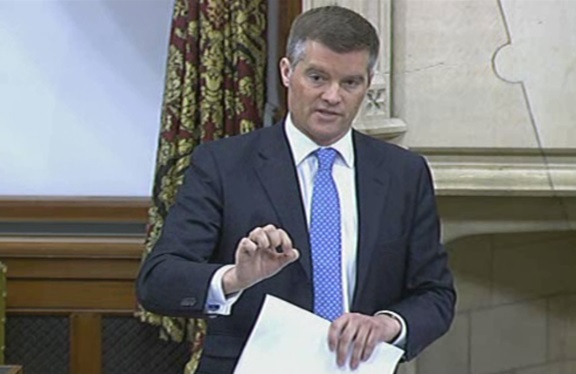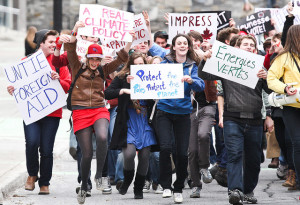We don’t need to lower the voting age to ensure MPs listen to the views of young people
Last week MPs debated the the case for lowering the UK’s voting age to 16, following Scotland’s decision to allow 16 and 17-year-olds to vote in the independence referendum. Mark Harper MP argued strongly against votes at 16 in the debate, in response to the proposal from Sarah Champion, which was featured on Democratic Audit yesterday. This post is an edited version of his speech, published as part of our series on youth participation.

Mark Harper MP argued against the proposal to lower the voting age. Credit: Houses of Parliament
My arguments for opposing the extension of the voting age to children — those below the age of majority — have nothing to do with Sarah Champion’s straw-man arguments about people’s competence, intelligence or ability to reach a rational decision. My point is simple. We have to have a voting age, and some people will be on one side of that cut-off point and some people will be on the other. I think there is general agreement about that. The real question is where we set the age. My view is that the right age is the age at which we decide that someone moves from being a child to being an adult. That is the right cut-off point at which someone should be able to vote and make a serious decision about who governs their country.
One argument put forward by those who favour votes at 16 is to allege that in a range of policy areas 16-year-olds have certain rights. Proponents tend to set out half the story but forget to fill in the missing pieces. In England and Wales it is perfectly true to say that 16-year-olds can get married, but there is a significant qualification, namely that they have to have permission from their parents. We do not accept, therefore, that 16-year-olds are capable of making that important, life-changing decision; we say that they must have parental consent.
When it comes to joining the armed forces, there are again two important qualifications. First, although 16-year-olds can join Her Majesty’s armed forces, they cannot do so without the consent of their parents. We do not accept that 16-year-olds should be able to join the armed forces purely on their own say-so; we insist that their parents’ consent to that decision. Secondly, we do not deploy 16-year-olds in theatres of armed conflict. We make a clear decision, following on from the UN convention about child soldiers, that we do not deploy young people in conflict zones until they attain the age of 18.
I accept that there are some things that people can do at the age of 16. The age of sexual consent is 16, although there are two scenarios in which we do not accept that someone under 18 is able to make a sensible decision. In a case under the Sexual Offences Act 2003 of abuse of a position of trust, we make a distinction between those aged 16 or 17, and those aged 18 or over. We make a similar distinction about whether someone is able to consent to be in pornography. We say that they are unable to do so until they are 18, for sensible reasons of child protection that I very much support.
On the school leaving age the trend on that issue is in the opposite direction. We are now mandating education or training until age 18, although I recognise that that applies in England and not in Scotland, Wales or Northern Ireland. The age limit for purchasing tobacco has changed, for sensible reasons. Personally, I have no problem with adults smoking. I do not think it is a pleasant habit, but I think that adults should be free to make the decision to smoke, although I would not do so myself. However, we think that we should protect children from tobacco, and we do not allow them to purchase it until they are 18. It would be a bit odd to say to children, “We don’t think you’re able to make a decision about smoking tobacco until you’re an adult, but we do think you’re able to vote for representatives who will make decisions about legislation.”
We do not let people gamble until they are 18, with the exception of playing the national lottery and buying certain scratchcards. Many film classifications still have an 18 certificate. We accept that there are many items of subject matter in films, videos and DVDs that we should not allow children to watch. Since I have been in Parliament, there has been an interesting debate — again, one of its proponents was someone who thinks that we should lower the voting age — after which the Houses of Parliament passed the Sunbeds (Regulation) Act 2010, in which we decided that those under 18 years of age were not capable of exercising a decision whether to have a tan or not. That may or may not be a sensible decision — I did not feel particularly strongly one way or the other — but I find it slightly odd that the same people who pass legislation saying that someone must be an adult to make such decisions think that we should lower the voting age. That is not very intellectually consistent.
The reason why I have focused on these age categories is that if we do not set the voting age at 18 — the age at which we suggest that children become adults — I am slightly concerned about where we will set it. I am concerned that once we move it to 16, there are no good reasons why we should not make it 14 or 10, for example. We say that 10 is the age of criminal responsibility, at which people may be held accountable for their actions, so why not 10, 12 or 14? I have met plenty of 14-year-olds in my constituency who are perfectly capable of listening to facts and arguments, making very good arguments themselves and making up their own minds. By Sarah Champion’s argument, there is no logical reason why I should not give them the vote. If we move away from 18, there is no obvious place to stop, which I think is a good reason for sticking where we are today.
In 2004, the Electoral Commission published the results of a review that it had carried out on the age of electoral majority; the review took 12 months and was pretty extensive, and it was set up under the previous Government. Having carried out that research, the Commission concluded that the minimum voting age should stay at 18. That conclusion was based on international comparisons; on the minimum age limits and maturity, and on research that the Commission had carried out among the public, which suggested there was strong support for keeping the minimum voting age at 18 and which also showed that young people themselves were divided on the question.
The Commission also referred to voter turnout, although I have to say that the argument about voter turnout is not my strongest argument; just because people between the age of 18 and 25 turn out to vote at very low levels, that is not in itself an argument against reducing the voting age. Having said that, it is an odd argument that lowering the voting age will engage more people, because there is no evidence that suggests that 16 to 18-year-olds would turn out to vote in higher numbers than those aged between 18 and 25.
The Commission recommended that the candidacy age should be brought into line with the voting age and thus be reduced from 21 to 18. That is a very sensible proposal. It seems to me that if someone is able to vote and make a decision about who their representatives are, they ought to be able to stand to be one of those representatives themselves. The House has debated the issue previously and I know that a number of younger people have been elected to local authorities, although no one under the age of 21 has been elected to the House of Commons. As I say, the suggestion seems perfectly sensible, but it prompts a question. If someone believes in reducing the voting age to 16, do they also believe that 16 to 18-year-olds ought to be able to be candidates at elections?
There is an obvious difference between enfranchising women and reducing the voting age. Unless something horrible happens, a 16-year-old will become an 18-year-old in due course and will then be able to vote. Women, who were unable to vote were never going to be anything other than women and therefore were never going to be able to vote. So giving the vote to women is qualitatively different from giving the vote to children, because a 16-year-old may not be able to vote today but will of course be able to vote in two years’ time.
As an MP, I visit youth projects and schools. I visit schools right down to primary schools, where I talk to very young children, and right up to secondary schools, including sixth forms, where there are students who are old enough to vote today. I treat all the young people I meet with great respect. First, I respect them in themselves; we debate and have arguments. Secondly, I am of course very well aware as an elected MP that if I am talking to a 13-year-old today, in five years’ time that person will indeed be casting a vote. When I was first elected to the House in 2005 and I went round schools, I was very clear that in 2010, when I would be seeking re-election, any 13-year-olds to whom I spoke would indeed have a vote and would be able to make a decision on my future.
Consequently, I just do not follow the argument that just because someone is not entitled to vote today that we pay no attention to their views, because we only pay attention to people who can vote. I pay attention to the views of all my constituents. Some of my constituents — for example, Jehovah’s Witnesses — do not vote because they choose not to, but I still listen to their views and take their arguments seriously. About 30% of my constituents chose not to vote at the last general election, but when people come to me to state their views on something, I never engage in a conversation with them about whether they are likely to vote for me. I treat everyone’s views with great respect, so the idea that we do not listen to young people and we do not pay attention to what they think — that we do not think about tuition fees, education or similar things just because young people under the age of 18 are not able to vote — does not hold water.
We have to set the line somewhere, and I think that the right place to set it is the age of majority — the age of 18 — when we basically decide that children become adults. That is where I think the line is best left. I do not think that that means that we do not engage with children in debates and arguments in schools and colleges; I and all other MPs do engage with children in that way perfectly well. If we treat young people with respect and engage them in the argument, they will have more respect for us than if we just agree with something that some of them think.
—
Click here to read Sarah Champion MP’s speech in favour of votes at 16.
Note: This post represents the views of the author and does not necessarily give the position of Democratic Audit or LSE. Please read our comments policy before commenting. Shortlink for this post: buff.ly/1l6sHWe
—
 Mark Harper was elected as Conservative Member of Parliament for Forest of Dean in 2005. From 2010 to 2012 he was Minister for Constitutional and Political Reform in the Cabinet Office.
Mark Harper was elected as Conservative Member of Parliament for Forest of Dean in 2005. From 2010 to 2012 he was Minister for Constitutional and Political Reform in the Cabinet Office.






 Democratic Audit's core funding is provided by the Joseph Rowntree Charitable Trust. Additional funding is provided by the London School of Economics.
Democratic Audit's core funding is provided by the Joseph Rowntree Charitable Trust. Additional funding is provided by the London School of Economics.
Arguments from @Mark_J_Harper on why 16/17 year olds shouldn’t be allowed vote (and MPs should hear their views): https://t.co/pMwFi3mcDC
We don’t need to lower the voting age to ensure MPs listen to the views of young people https://t.co/2qVJ3pCFIw
@Mark_J_Harper argues MPs will listen to young people without lowering voting age https://t.co/A3tIwrsJ00 @votesat16 @HansardSociety
@Mark_J_Harper argues MPs will listen to young people without lowering voting age https://t.co/A3tIwrsJ00 @SarahChampionMP @SadiqKhan
We don’t need to lower the voting age to ensure MPs listen to the views of young people https://t.co/5yROTOWpw0 One for Phil Cowleys of UK?
What this: https://t.co/4aRDupy0Bm ignores is that those of us who want votes at 16 do so because we believe 16yo’s deserve more respect.
“We don’t need to lower the voting age to ensure MPs listen to the views of young people” by @mark_j_harper https://t.co/4H6ABgTJ6S > I agree
We don’t need to lower the voting age to ensure MPs listen to the views of young people, says @Mark_J_Harper MP https://t.co/ctD51OL3Kb
We don’t need to lower the voting age to ensure MPs listen to the views of young people https://t.co/nNm7agJdwM